This article is a Cover Story selection, a weekly feature highlighting the top picks from the editors of America Media.
The storefront of Franciscan Peacemakers on Lisbon Avenue in Milwaukee looks—and smells—a little like a spa.
It is a warm, feminine space, in both feeling and décor, with natural wood tones set against white shiplap that would make the HGTV interior designer Joanna Gaines proud. The artfully stocked shelves are lined with soaps, candles, bath bombs and lotions; inhale, and scents like honey oatmeal and lemon verbena fill your lungs. Above the checkout counter, the words “Peace and All Good” are mounted in gleaming metallic signage.
In the workspace behind the retail area, Amber busies herself making candles, filling Cyber Monday orders and greeting visitors who come into the store. There are three weeks until Christmas, and the temperature outside is hovering in the teens. Every opening of the door brings with it a rush of bitterly cold air.
Polite and soft-spoken, Amber (who has requested to be identified only by her first name) explains that this is her first traditional job.
It “saved my life,” she said.
Franciscan Peacemakers is a nonprofit organization ministering to women who have experienced or are experiencing sexual exploitation and the many comorbidities of that trauma—addiction, abuse and poverty, to name just a few. This storefront is the home base for the Peacemakers’ social enterprise, which provides women survivors of sexual trafficking with work experience and a means to support themselves financially.
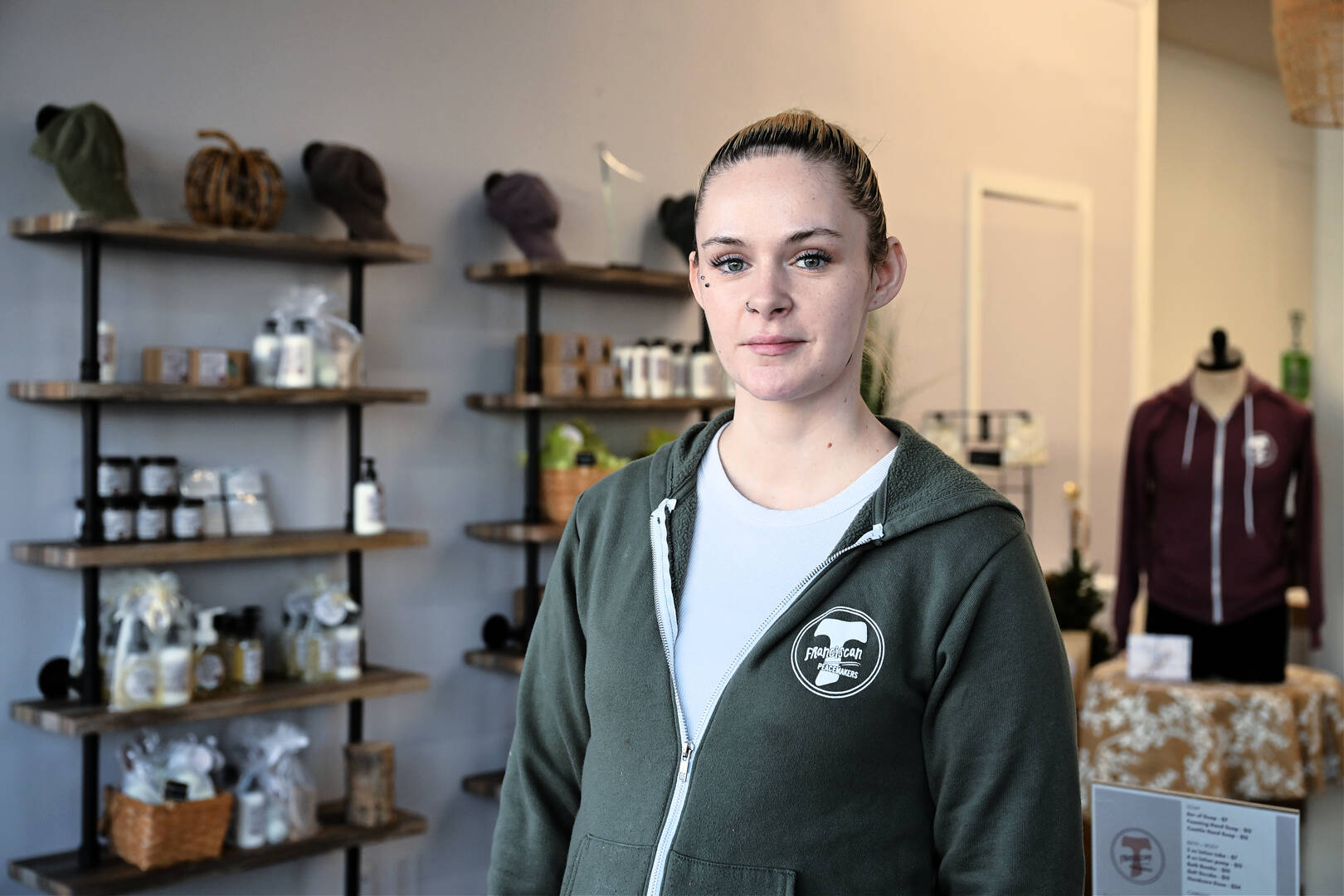
Amber has been in Franciscan Peacemakers’ Clare Community program for 18 months. She is now 27 years old, but her struggles with addiction began when she was a teenager.
“I have an allergy of the body and an obsession of the mind,” she said. For years, Amber’s life was a cycle of drug use, criminal activity to enable that drug use and unhealthy relationships. The cycle was occasionally interrupted with attempts to recover, to start over, to build something better for herself.
But she was never able to create a sustainable life without drugs and prostitution—at least not until 2023, when Deacon Steve Przedpelski came to visit her in the Walworth County Jail.
Asking Better Questions
Franciscan Peacemakers was founded in 1995 by two Capuchin priests who started handing out bag lunches to women who worked as prostitutes on Milwaukee’s North Side. Soon after, they began partnering with suburban parishes to distribute the lunches.
That is where Deacon Przedpelski came in. Newly ordained as a permanent deacon, he was leading groups of young people from West Bend, Wis., about 30 miles northwest of Milwaukee, on service opportunities that immersed them in Catholic social teaching. They heard about Franciscan Peacemakers through a news article.
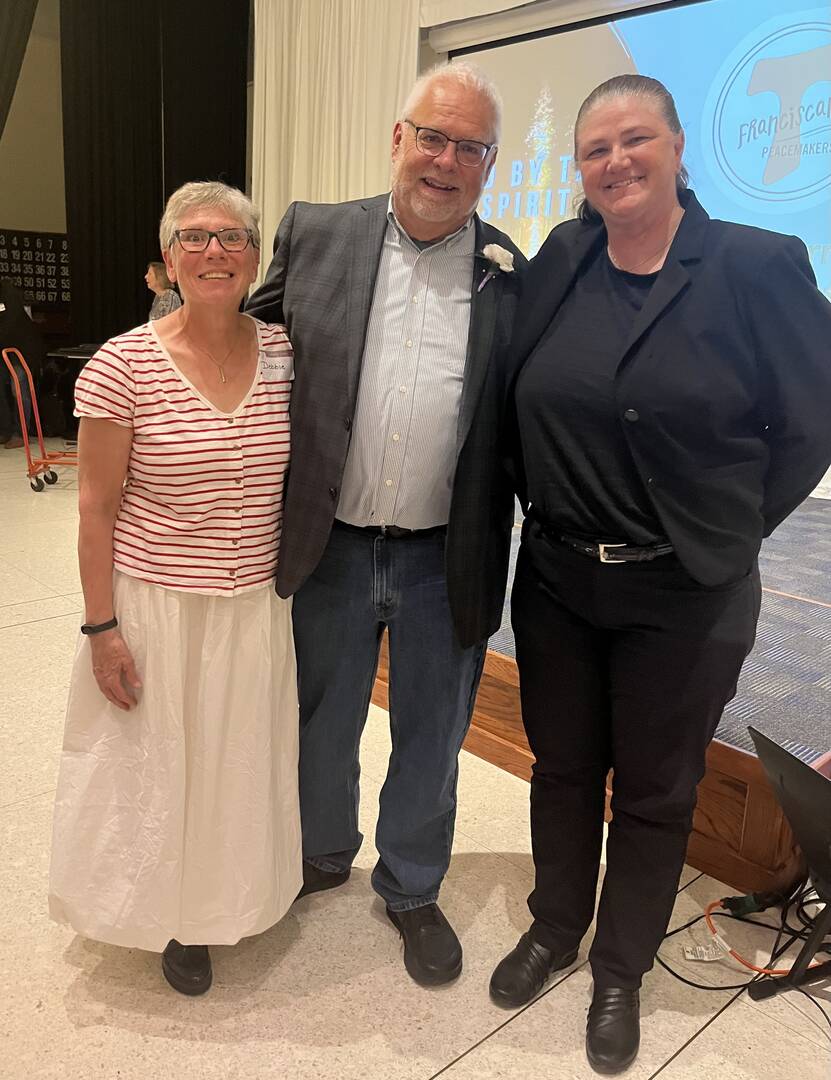
“I was very intrigued,” Deacon Przedpelski recalled. He and his wife, Debbie, a social worker, began taking groups of children from a social-justice-based youth group at his parish to help distribute the lunches. At the time, Franciscan Peacemakers was trying to get started as an official nonprofit. Deacon Przedpelski offered to help out for six weeks.
That was almost 30 years ago. Just last year, he retired as the organization’s executive director. In that time, the structure and the ministry of the Peacemakers evolved, along with the world’s understanding of the women they serve.
Deacon Przedpelski learned quickly that in order to actually help the women, he needed to know them. And to know them, he needed to ask better questions.
“I had always initially taken the approach of ‘How can I help you?’” he said. Instead, he began asking: “What is your story? What brought you to this point?”
Almost universally, the answer was some form of early childhood trauma, often sexual abuse.
“And the women, right up to the last day [of my career], continued to teach me what was happening in their lives and how they wound up in whatever situation they were in,” he said.
When a partner agency called him in 2023 to refer Amber’s case, he brought Cynthia with him to the jail. Cynthia (who has also requested to be identified only by her first name) spent close to a decade on the streets, addicted to drugs and experiencing sexual exploitation, before coming to the Peacemakers.
Deacon Przedpelski could see that within five minutes of meeting, Cynthia and Amber had established a connection. He excused himself to let them talk. If 30 years of this work has taught him anything, after all, it is the power of a woman who has decided to change her life.
Ultimately, the court allowed Amber to join the Clare Community Program, a two-year, residency-based, trauma care program operated by Franciscan Peacemakers that includes housing, support and resources for addiction recovery. When she first moved into the St. Bakhita Catholic Worker House, where the women of Clare Community live, Amber did not think she was going to stay.
“I didn’t know how to have friends. I didn’t want to talk to anybody,” she said. “But after a couple weeks I did some outpatient treatment, started meeting with a therapist, got my meds regulated.” She was offered a spot in the Franciscan Peacemakers’ social enterprise, and she found she was good at the work. More than that, she liked it. She liked the structure, the accountability, the fellowship. She liked meeting and exceeding the expectations that others had for her.
And for the first time, she was able to stay sober.
“I was never used to having people watch over me,” she said.
Many of the other women who enter the program have similar stories, said Anne Haines, founder and executive director of the St. Bakhita Catholic Worker House, which is a separate entity from the Peacemakers (though the two work collaboratively to support the women in Clare Community).
“Several of the women survivors have said to me: ‘It’s hard for me to understand when you give us things and you don’t expect something in return,’” she said. “Because they’re so used to the exact opposite.”
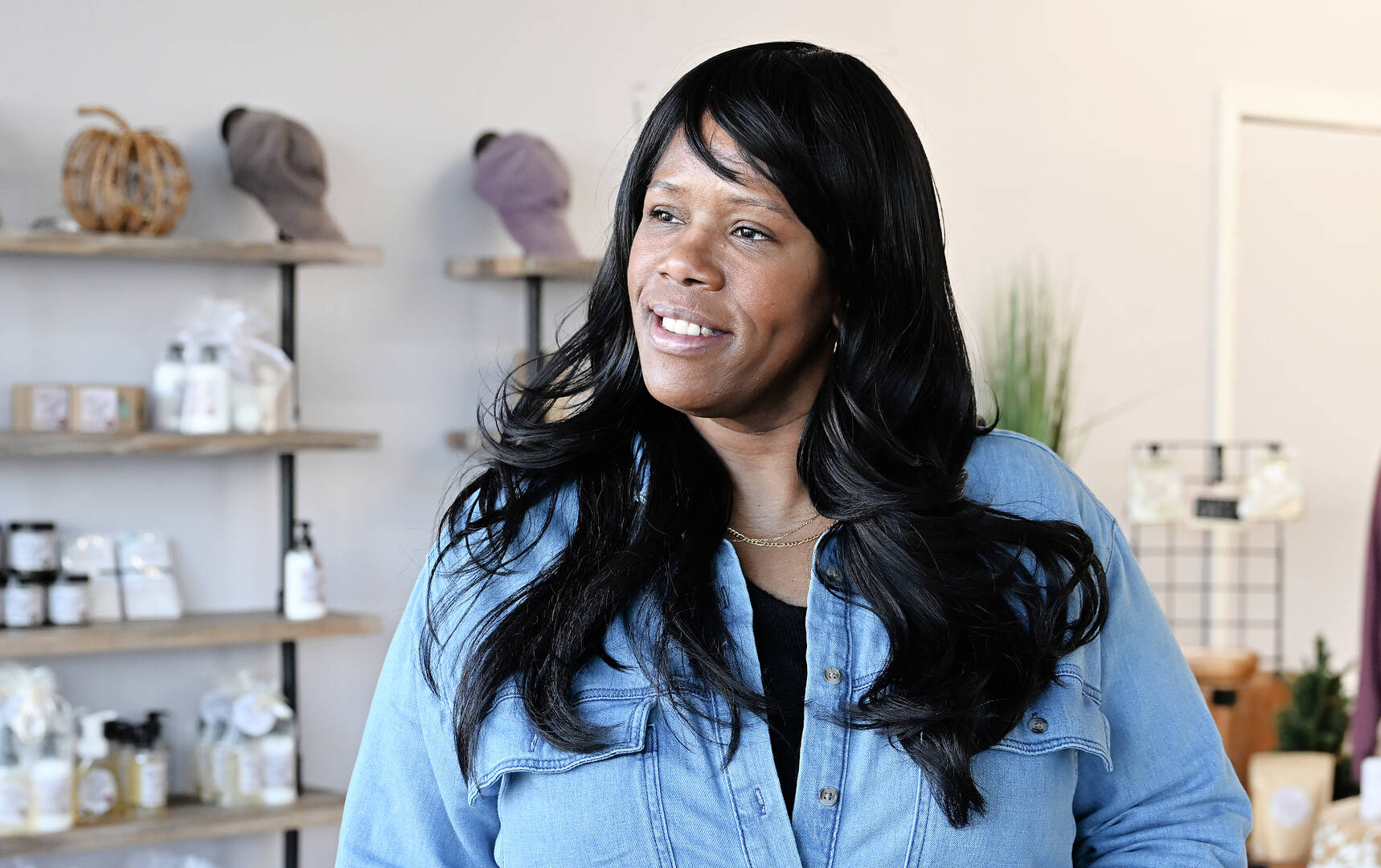
Originally from a small town in Pennsylvania, Cynthia is a mother, a grandmother and a former member of the National Guard. She came to Wisconsin in 2004 with her now ex-husband; after they broke up, she ended up on the streets, addicted to drugs.
“I was kind of hopeless,” she said.
Looking back, Cynthia said she can now see how adverse childhood experiences and social determinants of health “actually paved the way for me to become addicted to substances and being in unhealthy relationships.” But she didn’t have the luxury of that perspective when she was in the midst of addiction and sexual exploitation.
Cynthia got to know Deacon Przedpelski and his team well during those years. Through their street ministry, Franciscan Peacemakers offered food, basic necessities and fellowship to women in her situation, driving their vans through neighborhoods known for prostitution activity.
For a long time, Cynthia was not ready to accept their offers to aid in her recovery. “I didn’t want to believe I was being exploited,” she said. But in 2018, when a spot became available in the Clare Community program, she took it. “I was ready for an opportunity to save my life,” she said.
She hasn’t looked back. Today, Cynthia holds an associate’s degree and a bachelor’s degree and works as the Peacemakers’ outreach and recovery assistance specialist, helping women like Amber imagine a future on their own terms.
Behind the Peacemakers’ storefront and workspace is the Hospitality Center, open five days a week. In the Hospitality Center, women can come in off the street to warm up, drink coffee, use the restroom and talk with Franciscan Peacemakers staff. There, they will likely meet Cynthia, who still remembers the transformative power of being cared for with no judgment and no expectations.
“I know how horrible it is on that side of the coin,” she said. “I know it takes a lot of somebody loving on you before you start to want to love yourself.”
“There’s just such tremendous power in one woman working with another woman, sharing her experience, strength and hope, and not saying, ‘Here are the steps you have to take in order to recover,’ but just saying, ‘Here’s what worked for me. You don’t have to do this alone,’” said Megan O’Halloran, who succeeded Deacon Przedpelski as executive director of Franciscan Peacemakers in 2024.
Four generations of O’Halloran’s family have experienced addiction, so she is well-versed in the toll the disease can take on individuals and families—as well as the stigma they endure. It is a stigma shared by so many of the women who come to the building on Lisbon Avenue.
“Every woman that we serve is a person, first and foremost, worthy of love and dignity and care,” she said. “Every woman coming to the door is somebody’s daughter, is somebody’s mother, sister, friend.”
‘The Brokenness Isn’t Just on the Border’
The Hospitality Center is quieter than usual today; Ms. O’Halloran thinks it could be that police have done “sweeps” of the area and made arrests. This neighborhood, located on Milwaukee’s Near West Side, was founded by wealthy Germans in the 19th century. But as with other neighborhoods in Milwaukee, deindustrialization has taken its toll. Today, this area experiences poverty at more than double the rate of the rest of Wisconsin and has gained a reputation for being an area where sex trafficking occurs.
According to a 2019 study by the Wisconsin Department of Justice, local law enforcement has both “a desire and need for training on how to differentiate between prostitution and sex trafficking for both operational and data collection purposes.” That study noted that 24 agencies in 16 counties reported arrests of juveniles for prostitution between 2014 and 2018 but reported zero human trafficking incidents for that same period
The problem is that law enforcement, and the public in general, do not always know how to recognize sex trafficking when they see it. Because of this, the scope of the issue is hard to illustrate to the public.
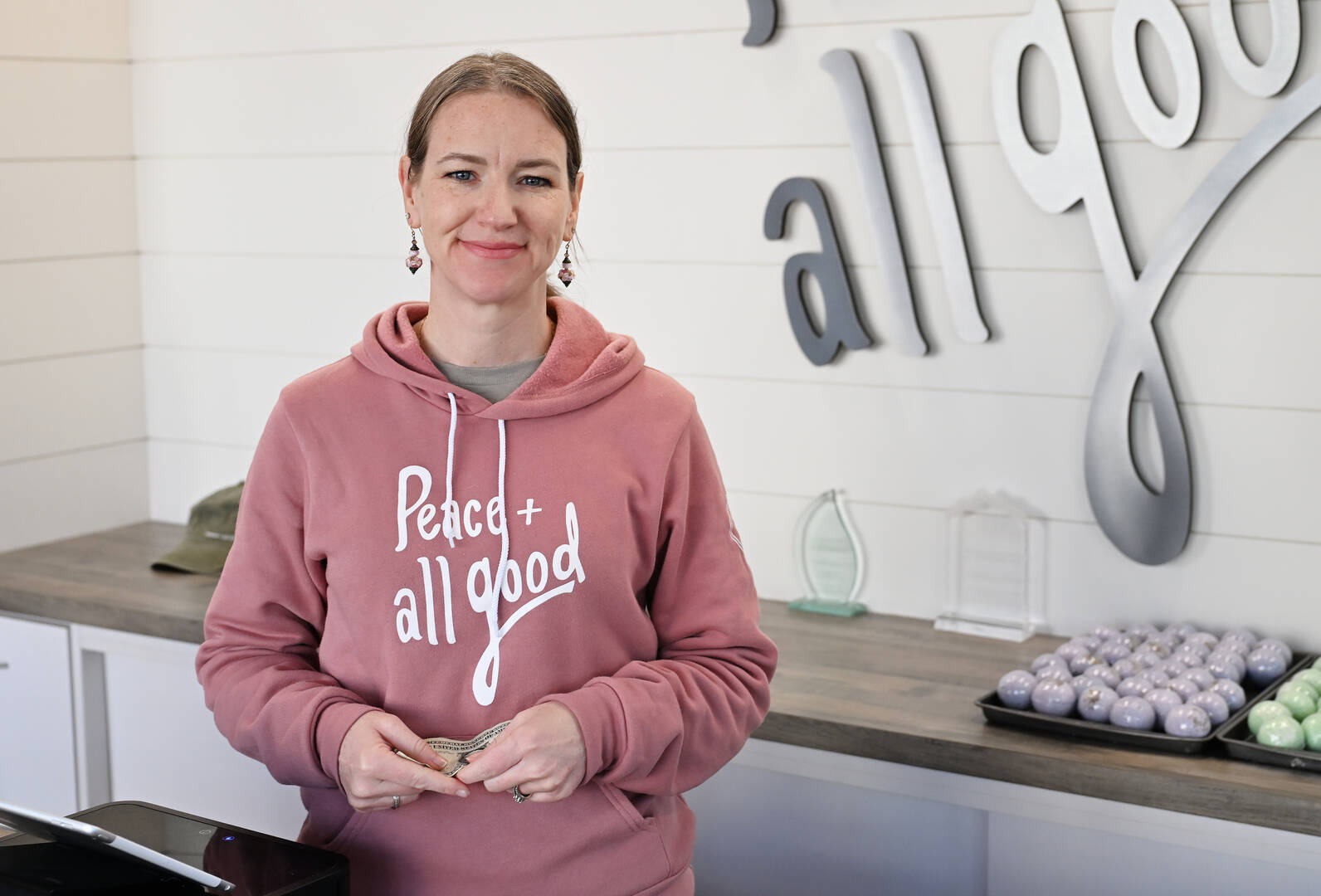
“What people don’t fully understand is the element of that fraud, coercion and force [that women are put in when they are being trafficked],” said Ms. O’Halloran. Victims, she said, “may not even recognize that it’s a trafficking situation themselves. They may think it’s a choice.”
“It took me a long time to come to terms with it,” said Cynthia. “People don’t realize it. They don’t see it for what it is, because we rationalize and we justify and we make it make sense to us so we can live with it.”
According to the U.S. Department of Justice, human trafficking is a crime involving the exploitation of a person for labor, services or commercial sex. Sex trafficking is legally defined in the Trafficking Victims Protection Act of 2000 as “the recruitment, harboring, transportation, provision, obtaining, patronizing, or soliciting of a person for the purpose of a commercial sex act” in which the act is “induced by force, fraud, or coercion.”
But when headlines refer to “human trafficking,” many people aren’t thinking of women who are being arrested and charged with prostitution, and the actions and circumstances that constitute “force, fraud and coercion” are not always well-understood or even universally agreed upon.
“It is just really hard to get people to understand that this is a problem,” said Debra Schneider, a board member of Franciscan Peacemakers and a coordinator of Faith Coalition Against Sex Trafficking. “People don’t believe that trafficking is a real thing. And in our state, there are many who don’t believe that a child who is 15, 16, 17 years old who is being prostituted is not just trying to make a buck.”
A member of St. James Catholic Church in Menomonee Falls, Wis., Ms. Schneider was serving on the parish’s human concerns committee when a staff member suggested they research the issue of human trafficking. She and a colleague spent a year talking to organizations working in the field and listening to survivors’ stories.
“What we discovered was that sex trafficking was a real issue in our own community,” said Ms. Schneider. She helped to found the coalition in 2019. The group hosts educational events at churches throughout southeastern Wisconsin, hoping to raise awareness of what sexual exploitation is, the risk factors for it and the obligation of faith communities to care for victims.
That kind of faith-community-based education and activism is encouraged by “Pastoral Orientations on Human Trafficking,” released in 2019 by the Vatican. Intended for use within Catholic dioceses, parishes and organizations throughout the world, the document follows years of papal denunciation of human trafficking—Pope John Paul II called it “a modern plague” in 2002—and emphasizes the need for a response from all followers of Christ to what Pope Francis has termed “an open wound on the body of contemporary society, a scourge upon the body of Christ.”
But too often, Catholics are unaware of the full spectrum of crimes that constitute human trafficking, said Felicitas Brugo Onetti, a social worker and anti-trafficking education and outreach coordinator for the U.S. Conference of Catholic Bishops.
“This issue is not well-understood,” she said. One reason is that, due to its portrayal in the media, “human trafficking” is often conflated with “human smuggling.”
“This misunderstanding is often due to the loose use of the term trafficking, which some use to describe the movement of people rather than the exploitation involved,” she said. “This feeds the misconception that addressing immigration issues or securing borders will eliminate human trafficking.”
Trafficking can involve movement, but it is a crime against the person, Ms. Brugo Onetti explained. It’s about “recruiting, harboring, providing or obtaining individuals for exploitation.” Borders don’t have to be involved, she said; this is happening to Americans, in American cities.
Semantics causes other issues with public perception. Deacon Przedpelski cautioned that overusing the term sexual exploitation, as opposed to forced prostitution or another more matter-of-fact term can prevent mainstream understanding of the level of violence inherent in the sexual trafficking business model. He said he uses both terms in his preaching and writing. “Some were uncomfortable hearing the term [forced prostitution]; others appreciated not whitewashing the problem,” he said. “Sex trafficking and violence go hand in hand. There is no polite or easy way to say it.”
In addition to the retail store and online sales, Franciscan Peacemakers’ social enterprise sells most of its products through farmers’ markets and in-person sales events, many of which take place at Catholic parishes throughout the Archdiocese of Milwaukee. These sales events are valuable opportunities to remind churchgoing Catholics of what human trafficking is and what it looks like. Ms. O’Halloran recalled that, at a recent event, she told an attendee that human trafficking happens in each of Wisconsin’s 72 counties. The man was shocked, she said.
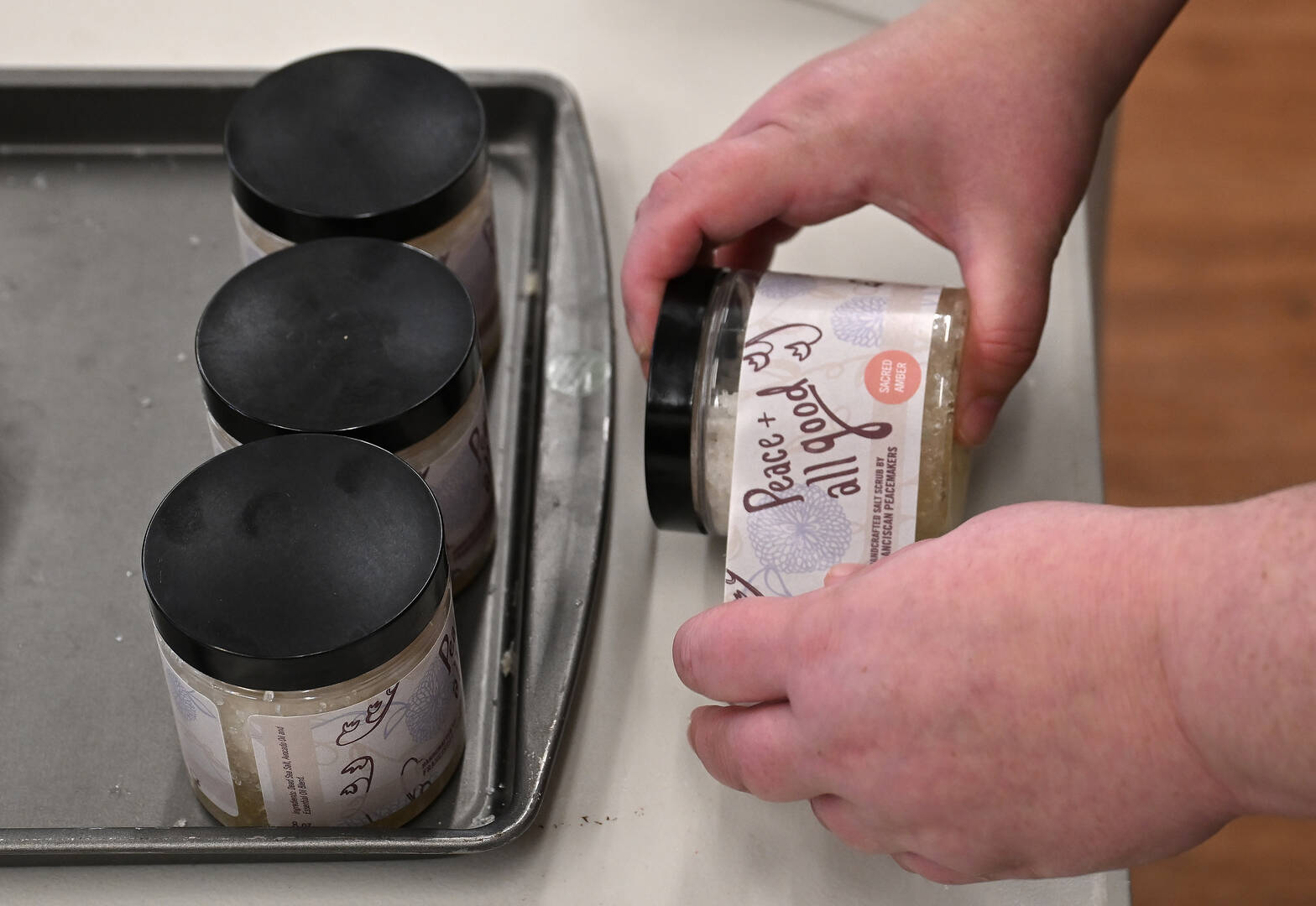
Deacon Przedpelski said he has witnessed similar reactions time and time again. He has spent the past 30 years visiting different Catholic parishes throughout the metropolitan Milwaukee area, preaching about the church’s obligation to victims of sexual exploitation. He has often been approached after Mass by people who saw themselves in his homily—women who had been trafficked, sometimes decades ago, and didn’t realize it, as well as men who were becoming addicted to pornography and desensitized to the violence and objectification to which it introduced them.
“Trafficking happens at the border, no doubt about it. But the brokenness isn’t just on the border and isn’t just on the streets in the city of Milwaukee. The brokenness is among those we worship with,” said Deacon Przedpelski.
“This isn’t a problem ‘over there.’ And it is not a problem that happens to ‘those types of women,’” said Ms. O’Halloran. “It is a problem that affects everyone throughout this country.”
‘You Don’t Have a Choice’
The victims of human trafficking come from every culture, every ethnic group and every tax bracket. But too often, they represent communities on the margins. Too often, their vulnerabilities are miscast as weaknesses and the results of poor decisions.
“A lot of people act like we’re broken, and I don’t look at it that way,” said Amber. “People look at [having worked as a prostitute] as a choice that we made. But while in active addiction, you don’t have a choice.”
Amber was only 16 or 17, she said, when she was first introduced to drugs in her small hometown of Twin Lakes, near the Wisconsin-Illinois border.
Before long, she was hooked on heroin and looking for a way to feed the addiction. A friend of a friend offered her a way to make money in exchange for sex. “At first I was forced to do it, but I was high all the time. So I didn’t even really realize what was going on until I sobered up,” she recalled. “And then finally I learned how to do it on my own because I was just trying to survive. I knew that I had a quick and easy way to make money and to feed my addiction.”
Because of persistent misunderstandings surrounding sexual exploitation, especially surrounding the circumstances that lead to it, recovery options currently available are not always effective. Deacon Przedpelski and his team began realizing this in the mid-2000s. The women they were helping, those who wanted to get off the street, needed something more than the short-term, 60-day or 90-day programs being offered.
“Women would participate in groups and they’d be working successfully on recovery, but still turning to prostitution for money because, at the time, it was harder for them to get employed,” he said.
In 2012 the Peacemakers heard about Thistle Farms, a group in Tennessee working with sex trafficking victims. Thistle Farms had launched a program to help lift the women out of the cycle of poverty and addiction while providing them with long-term housing and recovery support. With Thistle Farms’s help, Franciscan Peacemakers created their own version of the program in 2013. In 2014, they opened Clare Community, which offered supportive housing to women on their journey away from exploitation.
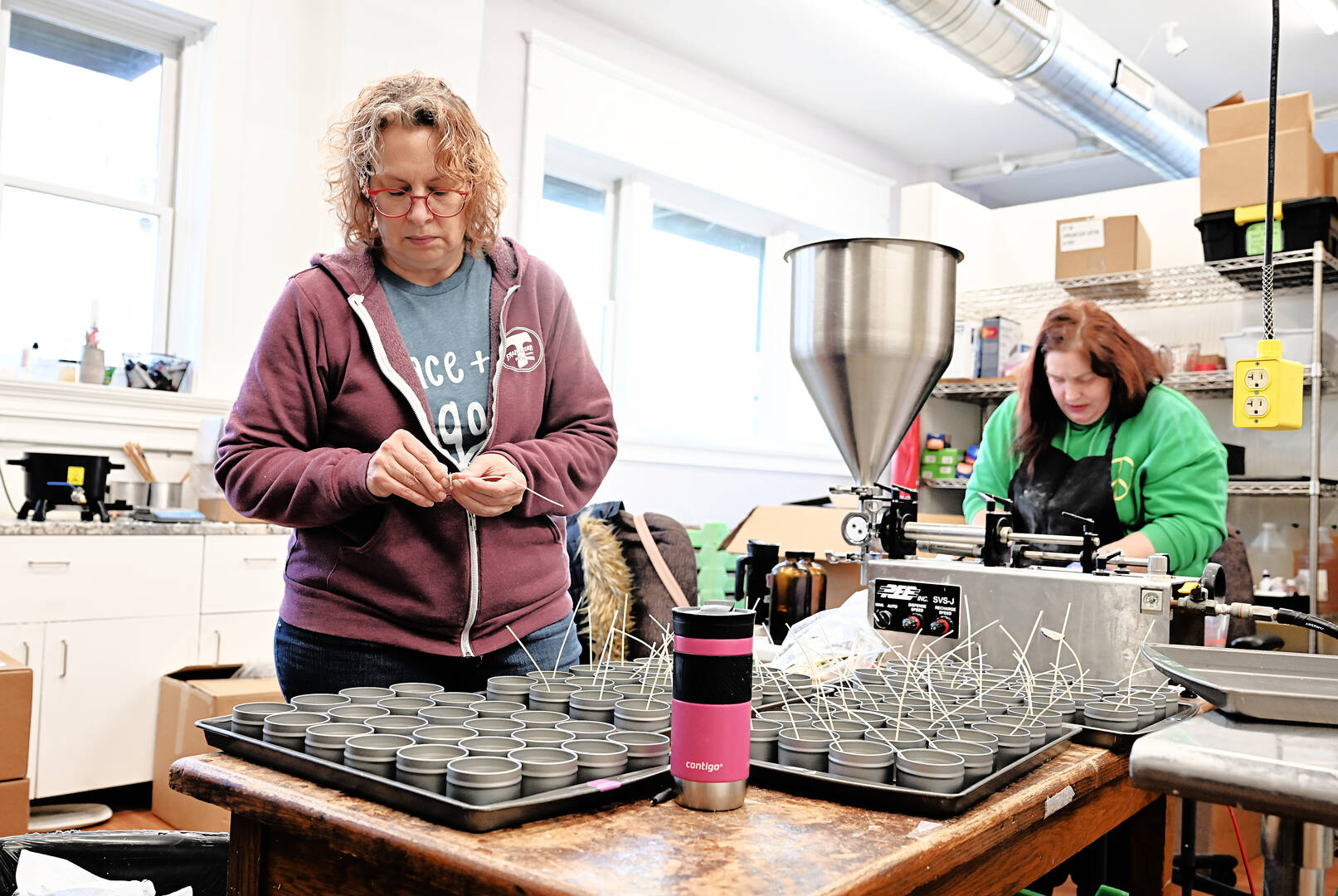
Currently, four women are in both the Clare Community Program and in Franciscan Peacemakers’ social enterprise. Joining the social enterprise is not a required part of Clare Community, merely one of its offerings, and a woman must have a length of documented sobriety before she comes to work on Lisbon Avenue.
“What we do is [create] community—a family,” said Ms. Haines, who lives full-time at the St. Bakhita Catholic Worker House. A former friary on the grounds of St. Martin de Porres Catholic Church in Milwaukee’s Harambee neighborhood, the house is just a few miles from the Peacemakers’ storefront.
“Our community has Christmas meals together. When I host Easter for my own family, the women are there too,” said Ms. Haines. “We decorate the Christmas tree together. We all eat together on Monday nights.”
Ms. Haines’s brother, Jeffrey, an auxiliary bishop of the Diocese of Milwaukee, visits the home to say Mass every Tuesday evening. No expectation is placed on the women to attend Mass, but they are welcome to.
“They take my breath away with their resilience,” said Ms. Haines of the women survivors. “I can’t believe sometimes after what they’ve been through that they’re open to trusting and loving again—open to relationship, open to community. I’m in awe of them and the strength they show.”
A Call to Consistency
Franciscan Peacemakers is not a spa, but perhaps the comparison is forgivable. A spa, after all, is a place where bodies come to find rest, rejuvenation, respect. And the women who come to this building are in dire need of all three—not just in body, but in spirit.
Deacon Przedpelski’s morning meditation all these years has been the Gospel of John, Chapter 13, where Jesus washes the feet of his disciples and commands them to do likewise. That’s how he sees the Peacemakers: washers of feet.
“It’s a call to consistency to all the broken,” he said of the story in John 13. “Regardless of their circumstances, regardless of their sexual orientation, regardless of the color of their skin. To do this means to be this servant to the marginalized, and to do it with love.”
The day before she spoke with America, Amber applied to a technical college. She has a savings account now, another stipulation for the women in the Clare Community Program.
“My plan is to go to college and get a management position somewhere,” she said. “I have a lot of hopes and dreams, and I guess we’ll see what happens. I can’t get too far ahead of myself, because all we have is today. Tomorrow’s not promised and yesterday’s gone.”
Cynthia is considering returning to school to earn her graduate degree. She has a lot of big plans for the Peacemakers, but she is starting with implementing “Warming Wednesdays” at the Hospitality Center, offering hot oatmeal, cocoa and a jacket to the ladies who stop in.
She wants every woman to leave the building on Lisbon Avenue with a little more warmth than she had coming in, a little more strength, a little more dignity.
And if a woman comes in and doesn’t have hope, Cynthia said, it’s OK. She has enough for them both.
“We’re holding that hope for them. We’re trying to speak that,” she said. “[We are trying to say,] ‘You deserve it. You’re worth it. You have value.’”







